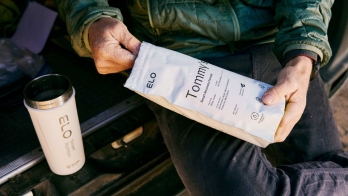Surprising sources of high protein foods
Are you tired of eating chicken to meet your protein needs? Here are some surprising sources of high protein foods that also have a Registered Dietitian’s stamp of approval.
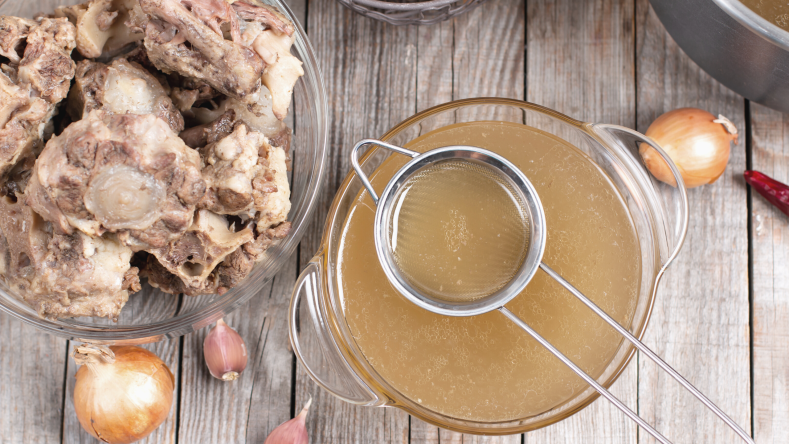
Whether you’re an athlete, recreational gym go-er, or simply looking to level up your nutrition, chances are you’ve turned to protein to help you reach your goals. While this is a good strategy, your diet can get monotonous if you only consume lean meat and energy bars as your protein sources. So, to help add more variety to your routine, we’ve asked some Registered Dietitians to weigh in on some of their favorite protein sources. From sardines to kefir, some of their answers may surprise you!
But before we dive into their recommendations, let’s unpack how much protein you need and why you should consider adding more high-protein foods to your diet.
How much protein do you need a day?
How much protein you need per day varies with age and can increase significantly with physical activity, injury, and illness. The Dietary Reference Intake (DRI) for protein for adults is as follows:
Sedentary men and women: 0.8 g protein/kg of body weight/day [
1
]Athletes and highly active men and women: 1.2-2.0 g/kg of body weight/day, depending on training needs and goals [
2
,3
,4
]Over 65 years old: 1 to 1.2 g protein/kg of body weight/day [
5
]
These numbers will vary depending on your activity level, age, and other needs, so talk with a dietitian or healthcare provider to see what is right for you.
Reasons to eat more protein
While protein is an essential macronutrient, it does more for your health than just boosting muscle mass. Here are some reasons science says you may want to add more protein to your diet.
Improves satiety levels. Studies show that protein’s satiating effects are mostly hormonal, as it can reduce ghrelin (a hunger hormone), boost peptide YY (another hormone that makes you feel full), and stimulate the release of several hormones that activate satiety centers in the brain [
6
].Better bone health. Protein has long been associated with stronger bones, a claim that’s been continually backed by science. Research suggests that people who eat a higher protein diet tend to maintain bone mass better as they age and have a much lower risk of osteoporosis and fractures [
7
].Lowers blood pressure. Studies indicate that a higher protein intake can lower blood pressure and may reduce risk factors for heart disease [
8
,9
].Weight management. Evidence suggests that high protein diets (consisting of 25-30% of your daily caloric intake from foods and supplements) will boost your metabolic rate and aid with weight loss [
10
,11
].Muscle growth. If you’re out to make more gains in the gym, you may want to reach for that extra protein shake. Studies have found that those who consumed additional protein after weight lifting showed increased muscle size and strength compared to those who didn’t [
12
].Recovery after exercise. Since protein helps repair and build muscle, adequate consumption helps speed recovery. Research shows that protein supplementation can ease soreness, reduce muscle damage, enhance muscle strength and size, and increase exercise performance [
13
,14
].
Surprising protein sources
If you want to add more protein to your diet, but don’t want to eat the same foods each day, give these dietitian-approved recommendations a try.
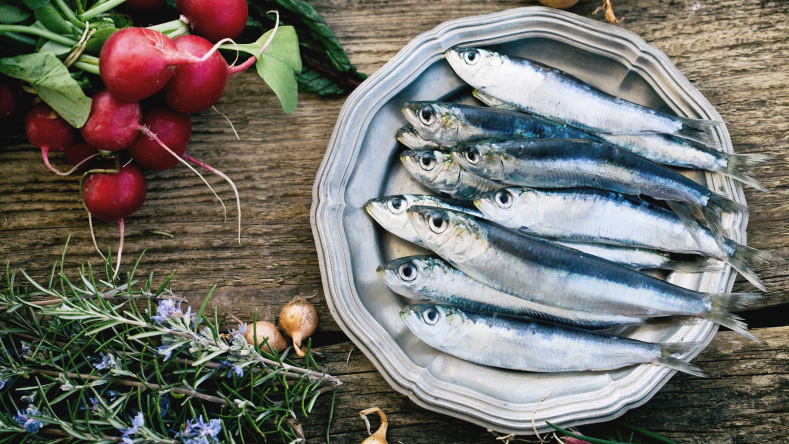
Sardines
Have you dipped your toe into the world of sardines? Even though these fish are small, sardines' nutrition rivals that of many more expensive seafood options and can certainly be considered a superfood.
Sardines offer more nutrition than you might think. Just a 4-ounce serving offers important nutrients like calcium, iron, potassium, vitamin B12, and vitamins A,D, and E. “Sardines are also rich in omega-3 fatty acids and DHA,” says Jessica Dogert 15 16 17
How much protein is in a can of sardines?
Sardines provide an impressive 28 g of protein in a 4-ounce serving, which is higher than other fatty fish like salmon, mackerel, or black cod.
You can enjoy canned sardines on toast, crackers, or by themselves.
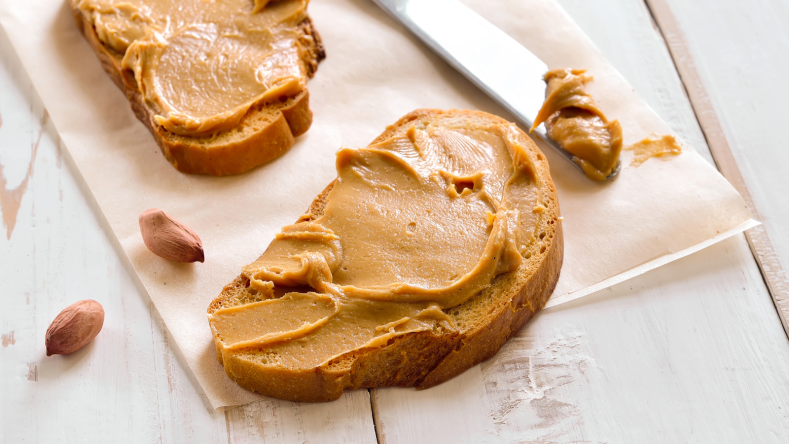
Peanut butter
Believe it or not, a good ol’ peanut butter and jelly sandwich can go a long way in terms of protein. This classic combo uses two slices of bread and one serving of peanut butter to pack a generous 18 g of protein. Plus, it combines carbohydrates and fats to increase satiety and provide more energy.
That’s why Caila Yates
How much protein is in peanut butter?
A 3.5-ounce portion of peanut butter contains 22.5 grams of protein, whereas one serving (2 tablespoons) contains around 8 g of protein. This makes it an excellent plant-based protein source.
Bone broth
The internet has gone crazy over bone broth in recent years, but is there any science to back up the hype?
Research says yes. Bone broth packs a powerful protein punch (9 g in a 1 cup serving) and is also rich in collagen, which can be beneficial for joints, bones, and muscles.
Collagen (the most abundant protein in the human body) has been shown to improve symptoms of osteoarthritis and reduce overall inflammation, joint pain, and stiffness [ 18 19
Learn more about the benefits of collagen
here
.
If you’re looking to boost your protein and collagen intake simultaneously, try adding bone broth to your soups, smoothies, mashed potatoes, or desserts. You can even drink it on its own! And since bone broth also contains electrolytes, Dogert says it could be a great post-workout treat for those who want to level up their performance and enhance recovery.
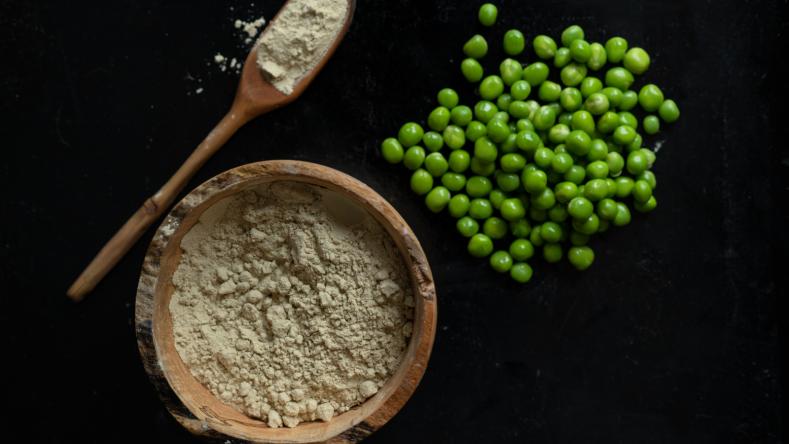
Green peas
Despite peas getting a bad rap during your childhood, there is mounting evidence that might convince you to put them back on the nice list.
There are nearly 9 g of protein in peas for a one-cup serving, making this an excellent plant-based protein source. Moreover, one serving offers 25% of your daily fiber, thiamine, folate, manganese, and vitamin A, C, and K needs and provides a good source of iron, magnesium, phosphorus, zinc, copper, and several other B vitamins [ 20 29 30
While anyone can enjoy peas, Alayna Hutchinson
If you’re looking to eat more peas, Hutchinson recommends throwing them into a blended smoothie for a protein kick. You can also pair them with almonds for a nutrient-dense snack, include them as a side dish, or toss them into a veggie stir-fry.
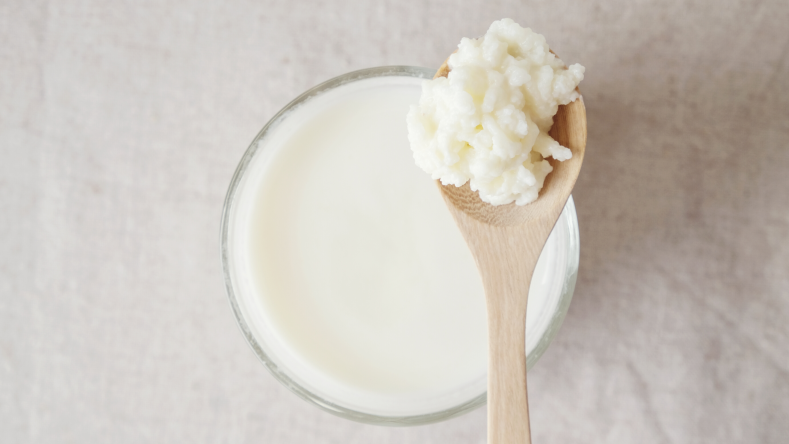
Kefir
You don’t have to just eat solid foods to get enough protein; ready-made liquids like kefir are an excellent option for those looking to boost their protein intake.
What is kefir?
Kefir is a fermented drink that originated in parts of Eastern Europe and Southeast Asia, and is made by adding kefir grains to cow or goat’s milk. As such, it resembles a liquid blend of milk and yogurt.
Health benefits of kefir
If you’ve heard about the health benefits of kefir and have been curious to try it, you may want to consider hopping aboard the train.
Sarah Schlichter, MPH, RDN, creator of Bucket List Tummy Nail your Nutrition
Kefir has also been shown to improve bone health, aid in digestive problems, protect against certain cancers, improve allergy and asthma symptoms, and boost the immune system [ 21 22 23 24 25
How to eat kefir
Kefir can be added to smoothies, salad dressings, or baked goods. And while anyone can reap the benefits of this probiotic drink, Schlichter recommends it for athletes, as it is a convenient, packaged product that offers both carbohydrates and protein that are important for post-workout nutrition.
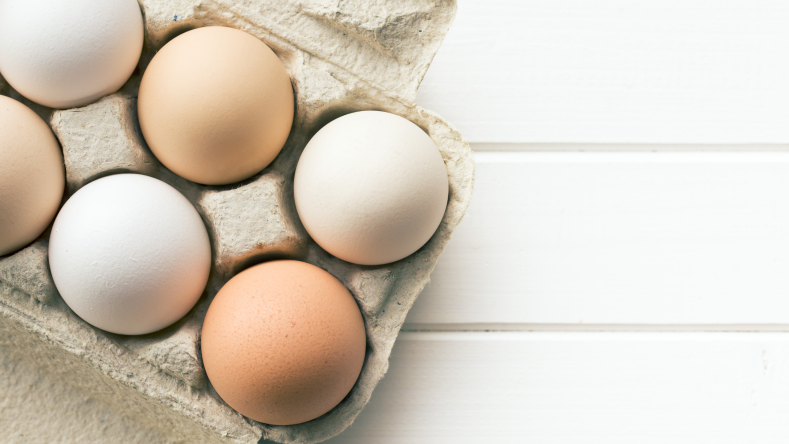
Eggs
Love eggs? You’re not alone–the average American consumes an estimated 286 eggs each year [ 26
According to Kelley Magill, dietitian and Elo health coach, “eggs are balanced and diverse with nutrients but also contain one of the highest scores of bioavailable protein.”
There are 7 g of high-quality protein in eggs, which may contribute to helping muscles recover and rebuild after a grueling workout. Moreover, eggs are a rich source of leucine and are also considered a complete protein, as they contain all essential amino acids needed for muscle recovery and growth. Magill suggests cooking your eggs and consuming egg white and egg yolk to reap the most protein benefits.
If you’re an athlete, it’s recommended to consume 15-30 g of high-quality protein and 15-90 g of carbohydrate post-workout to accelerate recovery, replenish fuel stores and promote muscle synthesis [ 27 28
Is 2 eggs enough protein after a workout? Get the answer
here
.
From hard-boiled to scrambled, you can enjoy eggs in a variety of ways throughout the day, which is why Magill says that eggs make for a great breakfast or convenient snack when on the road.
Summary
Incorporating more protein in your diet has been shown to improve satiety, help with weight loss, improve bone health, and boost recovery. However, things can get monotonous if you only consume lean meat and energy bars as your protein sources. Dietitian-approved foods such as sardines, bone broth, peanut butter, kefir, eggs, and green peas not only provide adequate amounts of protein, but they also offer other nutrients that are important for overall health.
Disclaimer: The text, images, videos, and other media on this page are provided for informational purposes only and are not intended to treat, diagnose or replace personalized medical care.
Key takeaways
Sardines provide an impressive 28 g of protein in a 4-ounce serving, which is higher than other fatty fish.
One serving of peanut butter contains around 8 g of protein, which makes it an excellent plant-based protein source.
One cup of kefir offers 8 grams of protein per cup and other essential nutrients like vitamin D, calcium, phosphorus, vitamin B12, and magnesium.
Eggs are a high-quality protein source and contain about 7 g of protein per egg.
While green peas offer 9 g of protein in a one-cup serving, they are also a good source of carbohydrates which are necessary for intense bouts of exercise.
References
Jäger, R., Kerksick, C. M., Campbell, B. I., Cribb, P. J., Wells, S. D., Skwiat, T. M., Purpura, M., Ziegenfuss, T. N., Ferrando, A. A., Arent, S. M., Smith-Ryan, A. E., Stout, J. R., Arciero, P. J., Ormsbee, M. J., Taylor, L. W., Wilborn, C. D., Kalman, D. S., Kreider, R. B., Willoughby, D. S., Hoffman, J. R., … Antonio, J. (2017). International Society of Sports Nutrition Position Stand: protein and exercise. Journal of the International Society of Sports Nutrition, 14, 20.
https://doi.org/10.1186/s12970-017-0177-8
Stokes, T., Hector, A., Morton, R., McGlory, C., & Phillips, S. (2018). Recent perspectives regarding the role of dietary protein for the promotion of muscle hypertrophy with resistance exercise training. Nutrients, 10(2), 180.
https://doi.org/10.3390/nu10020180
Carbone, J. W., & Pasiakos, S. M. (2019). Dietary protein and muscle mass: Translating science to application and Health Benefit. Nutrients, 11(5), 1136.
https://doi.org/10.3390/nu11051136
Deldicque, L. (2020). Protein intake and exercise-induced skeletal muscle hypertrophy: An update. Nutrients, 12(7), 2023.
https://doi.org/10.3390/nu12072023
Bauer, J., Biolo, G., Cederholm, T., Cesari, M., Cruz-Jentoft, A. J., Morley, J. E., Phillips, S., Sieber, C., Stehle, P., Teta, D., Visvanathan, R., Volpi, E., & Boirie, Y. (2013). Evidence-based recommendations for optimal dietary protein intake in older people: A position paper from the Prot-Age Study Group. Journal of the American Medical Directors Association, 14(8), 542–559.
https://doi.org/10.1016/j.jamda.2013.05.021
Blom, W. A., Lluch, A., Stafleu, A., Vinoy, S., Holst, J. J., Schaafsma, G., & Hendriks, H. F. (2006). Effect of a high-protein breakfast on the postprandial ghrelin response. The American journal of clinical nutrition, 83(2), 211–220.
https://doi.org/10.1093/ajcn/83.2.211
Hannan, M. T., Tucker, K. L., Dawson-Hughes, B., Cupples, L. A., Felson, D. T., & Kiel, D. P. (2000). Effect of dietary protein on bone loss in elderly men and women: The Framingham Osteoporosis Study. Journal of Bone and Mineral Research, 15(12), 2504–2512.
https://doi.org/10.1359/jbmr.2000.15.12.2504
Altorf-van der Kuil, W., Engberink, M. F., Brink, E. J., van Baak, M. A., Bakker, S. J., Navis, G., van 't Veer, P., & Geleijnse, J. M. (2010). Dietary protein and blood pressure: a systematic review. PloS one, 5(8), e12102.
https://doi.org/10.1371/journal.pone.0012102
Appel, L. J., Sacks, F. M., Carey, V. J., Obarzanek, E., Swain, J. F., Miller, E. R., Conlin, P. R., Erlinger, T. P., Rosner, B. A., Laranjo, N. M., Charleston, J., McCarron, P., Bishop, L. M., & OmniHeart Collaborative Research Group. (2005). Effects of protein, monounsaturated fat, and carbohydrate intake on blood pressure and serum lipids. JAMA, 294(19), 2455.
https://doi.org/10.1001/jama.294.19.2455
Pesta, D. H., & Samuel, V. T. (2014). A high-protein diet for reducing body fat: mechanisms and possible caveats. Nutrition & metabolism, 11(1), 53.
https://doi.org/10.1186/1743-7075-11-53
Veldhorst, M. A., Westerterp-Plantenga, M. S., & Westerterp, K. R. (2009). Gluconeogenesis and energy expenditure after a high-protein, carbohydrate-free diet. The American journal of clinical nutrition, 90(3), 519–526.
https://doi.org/10.3945/ajcn.2009.27834
Morton, R. W., Murphy, K. T., McKellar, S. R., Schoenfeld, B. J., Henselmans, M., Helms, E., Aragon, A. A., Devries, M. C., Banfield, L., Krieger, J. W., & Phillips, S. M. (2017). A systematic review, meta-analysis and meta-regression of the effect of protein supplementation on resistance training-induced gains in muscle mass and strength in healthy adults. British Journal of Sports Medicine, 52(6), 376–384.
https://doi.org/10.1136/bjsports-2017-097608
Brown, M. A., Stevenson, E. J., & Howatson, G. (2018). Whey protein hydrolysate supplementation accelerates recovery from exercise-induced muscle damage in females. Applied physiology, nutrition, and metabolism = Physiologie appliquee, nutrition et metabolisme, 43(4), 324–330.
https://doi.org/10.1139/apnm-2017-0412
Kim, J., Lee, C., & Lee, J. (2017). Effect of timing of whey protein supplement on muscle damage markers after eccentric exercise. Journal of exercise rehabilitation, 13(4), 436–440.
https://doi.org/10.12965/jer.1735034.517
Natto, Z. S., Yaghmoor, W., Alshaeri, H. K., & Van Dyke, T. E. (2019). Omega-3 fatty acids effects on inflammatory biomarkers and lipid profiles among diabetic and cardiovascular disease patients: A systematic review and meta-analysis. Scientific Reports, 9(1).
https://doi.org/10.1038/s41598-019-54535-x
Derbyshire, E. (2018). Brain health across the lifespan: A systematic review on the role of omega-3 fatty acid supplements. Nutrients, 10(8), 1094.
https://doi.org/10.3390/nu10081094
Morris, M. C., Brockman, J., Schneider, J. A., Wang, Y., Bennett, D. A., Tangney, C. C., & van de Rest, O. (2016). Association of seafood consumption, brain mercury level, and APOE ε4 status with brain neuropathology in older adults. JAMA, 315(5), 489.
https://doi.org/10.1001/jama.2015.19451
García-Coronado, J. M., Martínez-Olvera, L., Elizondo-Omaña, R. E., Acosta-Olivo, C. A., Vilchez-Cavazos, F., Simental-Mendía, L. E., & Simental-Mendía, M. (2018). Effect of collagen supplementation on osteoarthritis symptoms: A meta-analysis of randomized placebo-controlled trials. International Orthopaedics, 43(3), 531–538.
https://doi.org/10.1007/s00264-018-4211-5
Clark, K. L., Sebastianelli, W., Flechsenhar, K. R., Aukermann, D. F., Meza, F., Millard, R. L., Deitch, J. R., Sherbondy, P. S., & Albert, A. (2008). 24-week study on the use of collagen hydrolysate as a dietary supplement in athletes with activity-related joint pain. Current Medical Research and Opinion, 24(5), 1485–1496.
https://doi.org/10.1185/030079908x291967
Fooddata Central Search Results. FoodData Central. (n.d.). Retrieved July 27, 2022, from
https://fdc.nal.usda.gov/fdc-app.html#/food-details/170420/nutrients
Chen, H. L., Tung, Y. T., Chuang, C. H., Tu, M. Y., Tsai, T. C., Chang, S. Y., & Chen, C. M. (2015). Kefir improves bone mass and microarchitecture in an ovariectomized rat model of postmenopausal osteoporosis. Osteoporosis international : a journal established as result of cooperation between the European Foundation for Osteoporosis and the National Osteoporosis Foundation of the USA, 26(2), 589–599.
https://doi.org/10.1007/s00198-014-2908-x
Hoveyda, N., Heneghan, C., Mahtani, K. R., Perera, R., Roberts, N., & Glasziou, P. (2009). A systematic review and meta-analysis: probiotics in the treatment of irritable bowel syndrome. BMC gastroenterology, 9, 15.
https://doi.org/10.1186/1471-230X-9-15
Yu, A. Q., & Li, L. (2016). The Potential Role of Probiotics in Cancer Prevention and Treatment. Nutrition and cancer, 68(4), 535–544.
https://doi.org/10.1080/01635581.2016.1158300
Lee, M. Y., Ahn, K. S., Kwon, O. K., Kim, M. J., Kim, M. K., Lee, I. Y., Oh, S. R., & Lee, H. K. (2007). Anti-inflammatory and anti-allergic effects of kefir in a mouse asthma model. Immunobiology, 212(8), 647–654.
https://doi.org/10.1016/j.imbio.2007.05.004
Bourrie, B. C., Willing, B. P., & Cotter, P. D. (2016). The Microbiota and Health Promoting Characteristics of the Fermented Beverage Kefir. Frontiers in microbiology, 7, 647.
https://doi.org/10.3389/fmicb.2016.00647
Published by Statista Research Department, & 23, J. (2022, June 23). U.S.: Consumption of eggs 2020. Statista. Retrieved July 27, 2022, from
https://www.statista.com/statistics/280958/us-households-cosnumption-of-eggs
Kumar, V., Atherton, P., Smith, K., & Rennie, M. J. (2009). Human muscle protein synthesis and breakdown during and after exercise. Journal of Applied Physiology, 106(6), 2026–2039.
https://doi.org/10.1152/japplphysiol.91481.2008
Kerksick, C. M., Wilborn, C. D., Roberts, M. D., Smith-Ryan, A., Kleiner, S. M., Jäger, R., Collins, R., Cooke, M., Davis, J. N., Galvan, E., Greenwood, M., Lowery, L. M., Wildman, R., Antonio, J., & Kreider, R. B. (2018). ISSN Exercise & Sports Nutrition Review update: Research & recommendations. Journal of the International Society of Sports Nutrition, 15(1).
https://doi.org/10.1186/s12970-018-0242-y
Carr, A. C., & Rowe, S. (2020). The Emerging Role of Vitamin C in the Prevention and Treatment of COVID-19. Nutrients, 12(11), 3286.
https://doi.org/10.3390/nu12113286
Shakoor, H., Feehan, J., Al Dhaheri, A. S., Ali, H. I., Platat, C., Ismail, L. C., Apostolopoulos, V., & Stojanovska, L. (2021). Immune-boosting role of vitamins D, C, E, zinc, selenium and omega-3 fatty acids: Could they help against COVID-19?. Maturitas, 143, 1–9.
https://doi.org/10.1016/j.maturitas.2020.08.003



